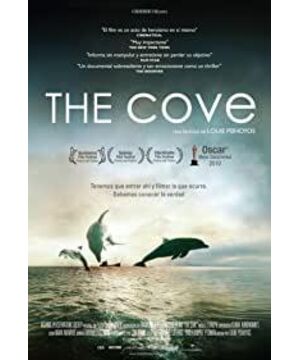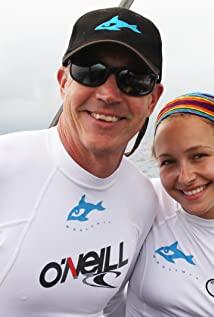Dolphin Bay told about this: There is a fishing village called "Taiji" in Japan, which kills tens of thousands of dolphins every year. At first, because of the rise of the dolphin show industry, fishermen captured dolphins and sent them to aquariums for training and export to various countries. However, this kind of capture is "extinct", and dolphins that are not picked by trainers will be massacred. Dolphin meat is worthless and is mostly sold as whale meat or sold at a low price and given to tourists and children - as a result, this incident annoyed veteran dolphin trainer Richard O'Barry, whose movies of dolphin performances in the past were very popular, and he didn't want it These lovely animals were brought disaster, but the Japanese fishery, from officials to fishermen, prevented and concealed this matter in every possible way, so the old man gathered a group of photography/diving experts, who spared no expense to sneak into the restricted area to make such a documentary.
Compared with other documentaries I have watched, "Dolphin Bay" obviously has a fascinating sense of plot: the protagonist is being followed on the road just approaching the town, and the stalker is not the gang boss but the Metropolitan Police Department; The endless obstruction and confrontation of the fishermen on the bay are the public lies of fishery officials and the ugly "money to buy votes" - such an appetite is no less than watching a crime movie. So, when the producers set up a hidden camera network with the skill of the legendary thieves, and finally got the evidence of the crime, everyone would feel very happy; what's more, when the protest was successful, the officials were dismissed, and the subtitles that the dolphins were released appeared, I It almost feels like love and justice have won.
However, when referring to the reason why the Japanese obstructed the filming, the film raised a possibility that "stubborn nationalism" was at work. Facing the position of "Dolphin Bay", the Japanese fishermen were also full of grievances: "Whaling and hunting dolphins are ours. Tradition", "We prefer not to listen to the orders of Western countries"; oh, what a familiar phrase. I suddenly thought out of time, that they are also "cute friends of human beings", what if "eating dolphins" is replaced by "eating dog meat"? Will our previously indignant moviegoing experience turn into an awkward silence?
——This thought just flashed by, because the previous blood and tears accusations had already made my grief and anger unable to stop the car. Looking back, "Dolphin Cove" is actually a documentary with an obvious subjective standpoint. This type of film will select more evidence to make you feel that it is righteous from the bottom of your heart, while covering up the differences that may be caused by ideology. So it's interesting to think about whether there are "tendency statements and hidden facts" in it: for example, at least dolphins are not as endangered as whales, so protecting dolphins doesn't seem so "urgent" more because people emotional needs. I remember that "Earth Pulse" asked a question behind the scenes: If animal protection agencies have limited funds, how would you choose endangered species to protect? The answer that the interviewed scholars tended to be is that they cannot be preferred because of what people like, because every species has a meaning to exist; if they have to be preferred, they tend to prefer the species at the top and bottom of the food chain, because this may be the most important thing to maintain balance— - In this way, I am more worried about the situation of sharks than the cute dolphins, they look fierce and unpleasant, and are on the verge of extinction from the Chinese table.
For another example, it is said that the mercury content in dolphin meat exceeds the standard because it is in the upper part of the food chain and is most enriched; but what I don’t understand is that there are many carnivorous fish in the same “class” as dolphins, and heavy metal pollution in seafood is also common. Heard, why does this film only emphasize that "dolphin meat cannot be eaten"? ——It’s not that I’m worried that the producer will distort anything. I just think that if there are more horizontal comparisons, it is better to speak with data facts than just tearing and sensationalizing. There is also a doubt that if it only involves food safety issues, it is enough to fully expose the test data. In addition, the value of dolphin meat is not high. Strengthening the argument from the perspective of economics and environmental protection can fully show that this move is "in a sinking ship." robbing business on board”, there is no hope at all, and maybe it may not have to be filmed in dangerous restricted areas.
- But, the gossip ends here. Compared to "Fahrenheit 9/11" or "The Absurdity of Religion," which baffles me with its decidedly one-sided editing, "Dolphin Cove" is still my favorite genre; for two reasons:
first, from my standpoint. I am very disgusted with hunting and killing wild animals for food. It is neither safe nor environmentally friendly. While not limited to dolphins, this film fits my values.
Second, "Dolphin Bay" is a more reasonable one among the "moving people with love" style documentary. It did not deliberately distort the facts and successfully sold its position. I was particularly moved by two scenes: one was the scene where a senior diver danced with dolphins in the blue and transparent ocean, touching the scene lightly, which reminded me of the happy song "The Hitchhiker's Guide to the Galaxy". so long and thanks for all the fish" at this moment I would believe that they are the wonderful creatures of "second intelligence on earth" no matter what. The second is that at the end, the old man finally got the evidence. At the international conference, he stood silently in the crowd of people and protested with the projector behind him. At that moment, I felt that he was really persistent, very persistent.
View more about The Cove reviews











